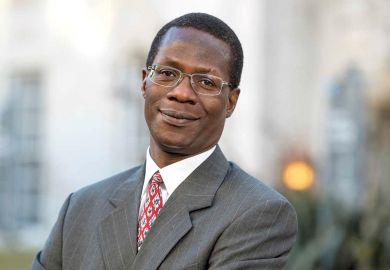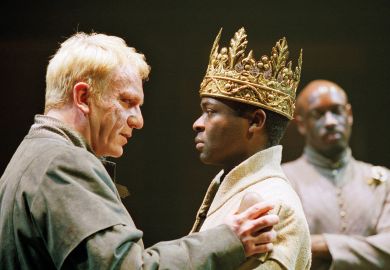The journey to becoming the youngest ever black professor at the University of Cambridge was not an easy one for Jason Arday, including a developmental disorder that meant he was unable to speak until he was 11.
However, speaking at Times Higher Education’s THE Campus Live conference, Professor Arday said standing on this “vista” would be wasted unless he was able to help others from under-represented backgrounds along the way.
Though he has been professor of sociology of education at Cambridge for almost two years now, the 39-year-old said it had been a “whirlwind”, particularly the global media attention that had come from being an academic who came from a less traditional route.
He went from being diagnosed, at the age of three, with a form of autism spectrum disorder that meant he was unable to speak until he was 11, or to read or write until he was 18, to becoming the youngest black professor at Cambridge and one of the youngest black professors of all.
But despite his setbacks, Professor Arday said, he had been fortunate in many ways – that his “paralysis of speech was a blessing”, that he had been blessed by a “perfect storm” of wider societal factors and that he had a number of invaluable mentors outside academia.
He said this was in contrast to a large number of exceptional black academics who had not had opportunities to progress in the academy – something he has been working to change throughout his career.
“Sitting and standing on a vista on your own is actually a pretty useless endeavour if you’ve got no one to share it with, and part of my work is really to bring as many people on and democratise these spaces as much as possible,” he told delegates in Birmingham.
Campus resource collection: Being Black in the academy
Professor Arday said he had to rely on his own self-belief and hard work ethic to overcome the many barriers that someone like him faced in academia – including a lack of mentorship towards someone who was not a “polished diamond”.
“It is quite exclusionary, it’s very elitist and it reproduces the same types of people,” he said. “In terms of finding that mentorship or that guidance or someone with a guiding hand, a lot of people gravitate towards the horse that they believe will win.”
Part of the reason for the media spotlight on Dr Arday, who has previously worked at the University of Glasgow and the University of Durham, is that he remains one of very few black professors in the UK today.
He now aims to continue helping others from under-represented groups to progress throughout academia and to make the atypical academic less of a “caricature”.
“I want to be part of that vanguard that creates a blueprint to provide more access and support for black academics while holding to account the people who are providing those opportunities and providing those jobs to ensure that they’re doing the right things to ensure things are more equitable.”
Register to continue
Why register?
- Registration is free and only takes a moment
- Once registered, you can read 3 articles a month
- Sign up for our newsletter
Subscribe
Or subscribe for unlimited access to:
- Unlimited access to news, views, insights & reviews
- Digital editions
- Digital access to THE’s university and college rankings analysis
Already registered or a current subscriber?








